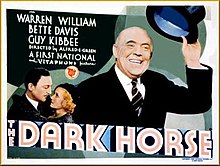Plot
The Progressive Party convention is deadlocked for governor, and so both sides nominate the dark horse Zachary Hicks (Guy Kibbee). Kay Russell (Bette Davis) suggests they hire Hal Blake as campaign manager; but first they have to get him out of jail for not paying alimony. Blake (Warren William) organizes the office and coaches Hicks to answer every question by pausing and then saying, "Well yes, but then again no." Blake will sell Hicks as dumb but honest. Russell refuses to marry Blake, while Joe (Frank McHugh) keeps people away from Blake's office. Blake teaches Hicks a speech by Lincoln. At the debate when the conservative candidate Underwood recites the same speech, Blake exposes him as a plagiarist. Hicks is presented for photo opportunities and gives his yes-and-no answer to any question, including whether he expects to win.
When Blake's ex-wife Maybelle (Vivienne Osborne) arrives at the office demanding to see him about another missed alimony payment, Joe wards her off by claiming Blake's aunt died and that he is away settling a big inheritance; but as she is leaving, Hicks makes eyes at her and takes her in to see Blake. She demands money or will send Blake back to jail. Blake asks Kay for $400 and pays Maybelle. Discovering its purpose, Kay angrily grabs the money back but returns it to Maybelle after receiving in the morning mail a necklace from Blake with a sentimental message. With Hicks heavily favored, Blake is expecting a $50,000 bonus for winning the election and gets Kay to agree to marry.
Underwood's manager Black secretly meets with Maybelle, who has been seeing Hicks, and plans a set-up to disgrace Hicks on the eve of the election. Maybelle lures Hicks out of town after he slips away from Joe, who is supposed to be watching over him. They go to a cabin where Maybelle initiates a game of strip poker with the candidate. Black brings the sheriff; but Blake and Joe get there first to remove Hicks, who has been reduced to a union suit. As Joe and Hicks escape out the back, the sheriff tries to arrest Blake for crossing a state line for immoral purposes. Blake claims they are married but has to wed Maybelle again to satisfy the sheriff. Kay walks out on Blake; but after Hicks wins the election, Blake gets Kay arrested for abandoning a child- him. They decide to head for Nevada to manage another campaign, while arranging another divorce and marriage.

Dangerous is a 1935 American drama film directed by Alfred E. Green and starring Bette Davis in her first Oscar-winning role. The screenplay by Laird Doyle is based on his story Hard Luck Dame.

Douglass Rupert Dumbrille was a Canadian actor who appeared regularly in films from the early 1930s.
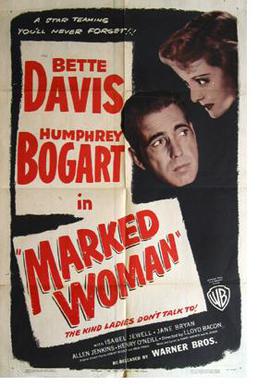
Marked Woman is a 1937 American dramatic crime film directed by Lloyd Bacon and starring Bette Davis and Humphrey Bogart, with featured performances by Lola Lane, Isabel Jewell, Rosalind Marquis, Mayo Methot, Jane Bryan, Eduardo Ciannelli and Allen Jenkins. Set in the underworld of Manhattan, Marked Woman tells the story of a woman who dares to stand up to one of the city's most powerful gangsters.

John Elmer Carson, known as Jack Carson, was a Canadian-born American film actor. Carson often played the role of comedic friend in films of the 1940s and 1950s, including The Strawberry Blonde (1941) with James Cagney and Arsenic and Old Lace (1944) with Cary Grant. He appeared in such dramas as Mildred Pierce (1945), A Star is Born (1954), and Cat on a Hot Tin Roof (1958). He worked for RKO and MGM, but most of his notable work was for Warner Bros.
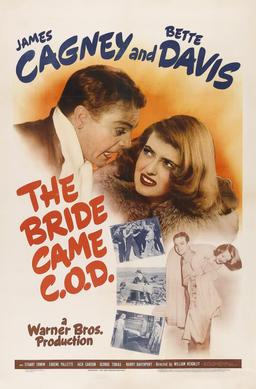
The Bride Came C.O.D. is a 1941 American screwball romantic comedy starring James Cagney as an airplane pilot and Bette Davis as a runaway heiress, and directed by William Keighley. Although the film was publicized as the first screen pairing of Warner Bros.' two biggest stars, they had actually worked together in Jimmy the Gent in 1934, and had wanted to find another opportunity to work together.
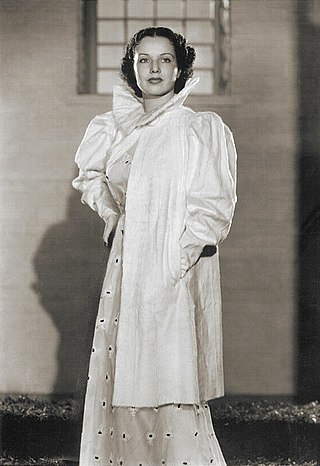
June Travis was an American film actress.

Edward Russell Hicks was an American film character actor. Hicks was born in 1895 in Baltimore, Maryland. During World War I, he served in the U.S. Army in France. He later became a lieutenant colonel in the California State Guard.

The Cabin in the Cotton is a 1932 American pre-Code drama film directed by Michael Curtiz. The screenplay by Paul Green is based on the novel of the same title by Harry Harrison Kroll.

It's Love I'm After is a 1937 American screwball comedy film directed by Archie Mayo and starring Leslie Howard, Bette Davis, and Olivia de Havilland. Based on the story "Gentlemen After Midnight" by Maurice Hanline, with a screenplay by Casey Robinson, the film is about a couple who have postponed their marriage eleven times and who continue to plot and scheme their way to marriage. The film marked the third on-screen pairing of Leslie Howard and Bette Davis, following Of Human Bondage and The Petrified Forest.

Fashions of 1934 is a 1934 American pre-Code musical comedy film directed by William Dieterle with musical numbers created and directed by Busby Berkeley. The screenplay by F. Hugh Herbert and Carl Erickson was based on the story The Fashion Plate by Harry Collins and Warren Duff. The film stars William Powell, Bette Davis, Frank McHugh, Hugh Herbert, Verree Teasdale, and Reginald Owen, and features Henry O'Neill, Phillip Reed, Gordon Westcott, and Dorothy Burgess. The film's songs are by Sammy Fain (music) and Irving Kahal (lyrics). Sometime after its initial release, the title Fashions of 1934 was changed to Fashions, replacing the original title with an insert card stating "William Powell in 'Fashions'".
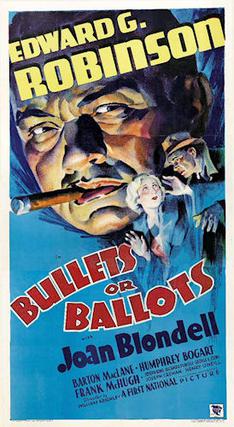
Bullets or Ballots is a 1936 American crime thriller film starring Edward G. Robinson, Joan Blondell, Barton MacLane, and Humphrey Bogart. Robinson plays a police detective who infiltrates a crime gang. This is the first of several films featuring both Robinson and Bogart.

Earthworm Tractors is a 1936 American comedy film directed by Ray Enright and starring Joe E. Brown, June Travis and Guy Kibbee. The film is also known as A Natural Born Salesman in the United Kingdom.

Vivienne Osborne was an American stage and film actress known for her work in Broadway theatre and in silent and sound films.

Gordon De Main was an American film actor. He was leading man for the New York–based Excelsior company in the early 1910s, and was later a supporting actor in many films, particularly Westerns.

Skyward is a 1980 American made-for-television drama film starring Bette Davis, Howard Hesseman, Marion Ross, Suzy Gilstrap, Clu Gulager and Lisa Whelchel. It was directed by Ron Howard, written by Nancy Sackett and broadcast on NBC on November 20, 1980.

The Famous Ferguson Case is a 1932 American pre-Code crime film starring Joan Blondell and directed by Lloyd Bacon. Grant Mitchell and Vivienne Osborne appear in support.
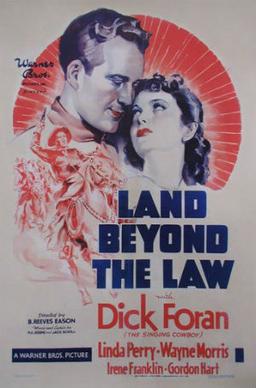
Land Beyond the Law is a 1937 American Western film directed by B. Reeves Eason and written by Luci Ward and Joseph K. Watson. The film stars Dick Foran, Linda Perry, Wayne Morris, Harry Woods, Irene Franklin and Frank Orth. It was released by Warner Bros. on March 13, 1937.
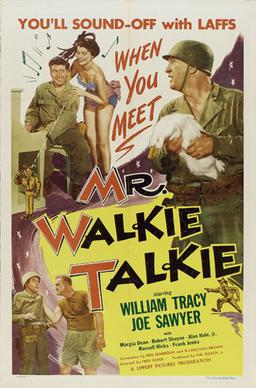
Mr. Walkie Talkie is a 1952 American comedy film directed by Fred Guiol and starring William Tracy, Joe Sawyer and Margia Dean. Released by Lippert Pictures, it is the final film of the Doubleday and Ames army comedy films originally produced by Hal Roach with the pair returning for service in the Korean War.

She Gets Her Man is a 1945 American comedy film directed by Erle C. Kenton and written by Warren Wilson, Clyde Bruckman, Ray Singer and Dick Chevillat. The film stars Joan Davis, William Gargan, Leon Errol, Vivian Austin, Milburn Stone and Russell Hicks. The film was released on January 12, 1945, by Universal Pictures.
